
The chestnut woodpecker a species of bird in subfamily Picinae of the woodpecker family Picidae. It is found on Trinidad and in every mainland South American country except Argentina, Chile, Paraguay, and Uruguay.

The rufous hornero is a medium-sized ovenbird in the family Furnariidae. It occurs in eastern South America, and is the national bird of Argentina. Also known as the red ovenbird, it is common in savannas, second-growth scrub, pastures and agricultural land and is synanthropic. Its range includes midwestern, southeastern and southern Brazil, Bolivia, Paraguay, Uruguay and northern and central Argentina, extending as far south as northern Patagonia. The species is most closely related to the crested hornero of Paraguay and Argentina. There are four accepted subspecies.

The common miner is a passerine bird in the subfamily Sclerurinae, the leaftossers and miners, of the ovenbird family Furnariidae. It is found in Argentina, Bolivia, Brazil, Chile, Peru, and Uruguay.
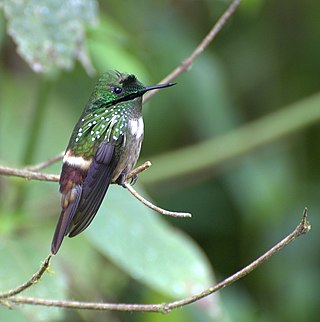
The festive coquette is a species of hummingbird in the "coquettes", tribe Lesbiini of subfamily Lesbiinae. It is endemic to Brazil.

The chestnut-headed crake is a species of bird in subfamily Rallinae of family Rallidae, the rails, gallinules, and coots. It is found in Bolivia, Brazil, Colombia, Ecuador, and Peru.
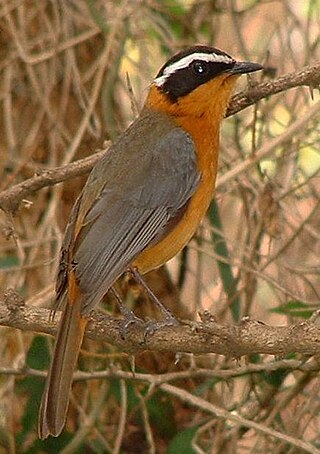
The white-browed robin-chat, also known as Heuglin's robin, is a species of bird in the family Muscicapidae. Found in east, central and southern Africa, its natural habitats include riverine forest and thickets, and it is also found near humans. The IUCN classifies it as a least-concern species.

The thick-billed miner is a species of bird in the subfamily Sclerurinae, the leaftossers and miners, of the ovenbird family Furnariidae. It is endemic to Peru.

The coastal miner is a species of bird in the subfamily Sclerurinae, the leaftossers and miners, of the ovenbird family Furnariidae. It is endemic to Peru.

The puna miner is a passerine bird in the subfamily Sclerurinae, the leaftossers and miners, of the ovenbird family Furnariidae. It is found in Argentina, Bolivia, Chile, and Peru.

The slender-billed miner is a species of bird in the subfamily Sclerurinae, the leaftossers and miners, of the ovenbird family Furnariidae. It is found in Argentina, Bolivia, Ecuador, and Peru.

The grey-throated leaftosser is a Near Threatened species of bird in the subfamily Sclerurinae, the leaftossers and miners, of the ovenbird family Furnariidae. It is found in Bolivia, Brazil, Colombia, Costa Rica, Ecuador, Panama, Peru, Trinidad and Tobago, and Venezuela.

The black-tailed leaftosser is a species of bird in the subfamily Sclerurinae, the leaftossers and miners, of the ovenbird family Furnariidae. It is found in Bolivia, Brazil, Colombia, Ecuador, French Guiana, Guyana, Peru, Suriname, and Venezuela.
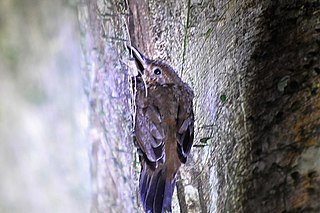
The short-billed leaftosser is a species of bird in the subfamily Sclerurinae, the leaftossers and miners, of the ovenbird family Furnariidae. It is found in Bolivia, Brazil, Colombia, Ecuador, French Guiana, Guyana, Peru, Suriname, and Venezuela.

The rufous-breasted leaftosser is a species of bird in the subfamily Sclerurinae, the leaftossers and miners, of the ovenbird family Furnariidae. It is found in Argentina, Brazil, and Paraguay.
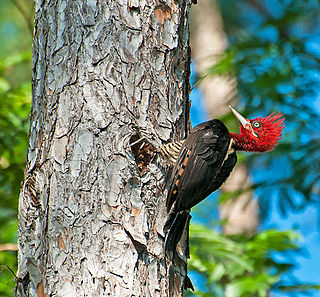
The robust woodpecker is a species of bird in subfamily Picinae of the woodpecker family Picidae. It is found in Argentina, Brazil, and Paraguay.
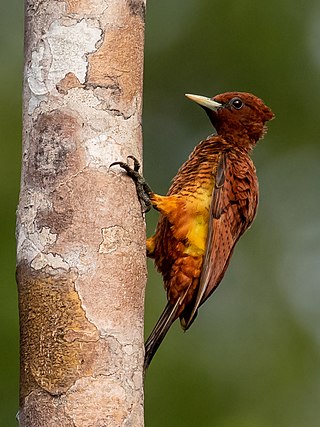
The scaly-breasted woodpecker, also known as the scale-breasted woodpecker, is a species of bird in subfamily Picinae of the woodpecker family Picidae. It is found in Bolivia, Brazil, Colombia, Ecuador, Peru, and Venezuela.

The pale-crested woodpecker a species of bird in subfamily Picinae of the woodpecker family Picidae. It is found in Argentina, Bolivia, Brazil, and Paraguay.

The rufous-headed woodpecker is a species of bird in subfamily Picinae of the woodpecker family Picidae. It is found in Bolivia, Brazil, Ecuador, and Peru.

The spotted piculet is a species of bird in subfamily Picumninae of the woodpecker family Picidae. It is endemic to Brazil.
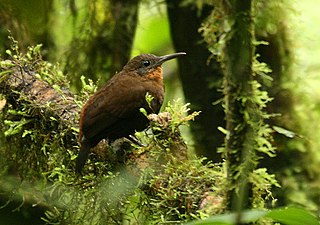
The dusky leaftosser or South American leaftosser is a bird in subfamily Sclerurinae, the leaftossers and miners, of the ovenbird family Furnariidae. It is found in Bolivia, Brazil, Colombia, Ecuador, French Giana, Guyana, Panama, Peru, Suriname, and Venezuela.























